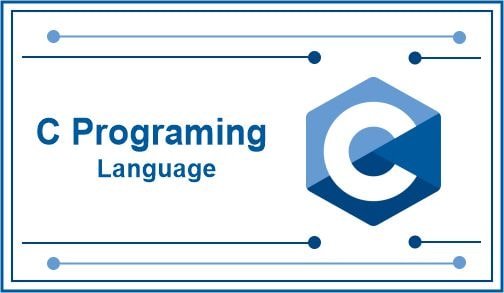COURSE DESCRIPTION
This course is designed to introduce participants to the fundamentals of the C programming language. Participants will learn about basic programming concepts, data types, control structures, functions, pointers, arrays, and file handling in C.
SYLLABUS
- Overview of programming languages and their types
- Introduction to the C programming language
- Setting up the development environment: compilers, IDEs
- Writing and compiling your first C program
- Understanding the basic syntax of the C language
- Data types in C: int, float, char, double, etc.
- Constants and variables in C
- Input and output in C: printf and scanf functions
- Conditional statements: if, else-if, switch
- Logical and relational operators
- Using conditional operators in C
- Working with loops: while, do-while, for
- Loop control statements: break and continue
- Nested loops and loop optimization techniques
- Understanding functions in C
- Function declaration, definition, and invocation
- Passing arguments to functions: call by value and call by reference
- Recursive functions in C
- Understanding scope and lifetime of variables
- Global vs. local variables
- Storage classes in C: auto, register, static, extern
- Introduction to arrays: one-dimensional and multi-dimensional arrays
- Accessing array elements and array manipulation
- Passing arrays to functions
- Understanding pointers and memory addresses
- Pointer arithmetic and pointer operations
- Dynamic memory allocation: malloc, calloc, realloc, free
- Introduction to structures and unions in C
- Declaring and accessing structure members
- Differences between structures and unions
- Introduction to file handling concepts
- File operations in C: opening, closing, reading, and writing files
- Error handling and file positioning
- Understanding preprocessor directives
- Using macros for code optimization and abstraction
- Overview of standard C libraries
- Building and using custom libraries
- Real-world applications and case studies
- Overview of programming languages and their types
- Introduction to the C programming language
- Setting up the development environment: compilers, IDEs
- Writing and compiling your first C program
- Understanding the basic syntax of the C language
- Data types in C: int, float, char, double, etc.
- Constants and variables in C
- Input and output in C: printf and scanf functions
- Conditional statements: if, else-if, switch
- Logical and relational operators
- Using conditional operators in C
- Working with loops: while, do-while, for
- Loop control statements: break and continue
- Nested loops and loop optimization techniques
- Understanding functions in C
- Function declaration, definition, and invocation
- Passing arguments to functions: call by value and call by reference
- Recursive functions in C
- Understanding scope and lifetime of variables
- Global vs. local variables
- Storage classes in C: auto, register, static, extern
- Introduction to arrays: one-dimensional and multi-dimensional arrays
- Accessing array elements and array manipulation
- Passing arrays to functions
- Understanding pointers and memory addresses
- Pointer arithmetic and pointer operations
- Dynamic memory allocation: malloc, calloc, realloc, free
- Introduction to structures and unions in C
- Declaring and accessing structure members
- Differences between structures and unions
- Introduction to file handling concepts
- File operations in C: opening, closing, reading, and writing files
- Error handling and file positioning
- Understanding preprocessor directives
- Using macros for code optimization and abstraction
- Overview of standard C libraries
- Building and using custom libraries
- Real-world applications and case studies

Course Features
- Lectures : 20
- Quizzes : 5
- Max Student : 20
- Certificate : Yes
- Assessments : Yes
- Mock-up Interview : Yes
- Mode : Online & Offline
- Language : English, Hindi

